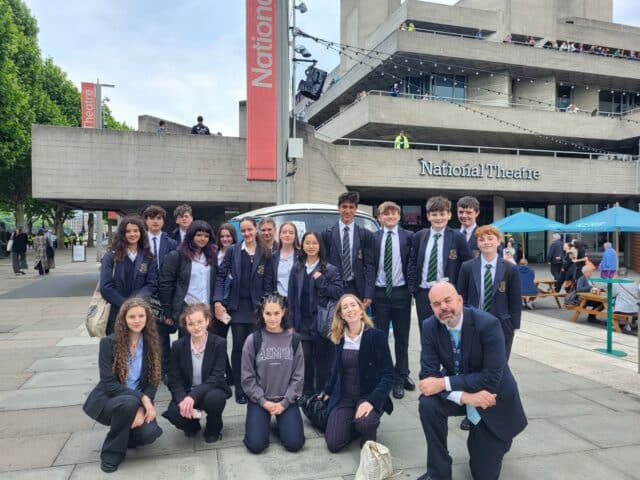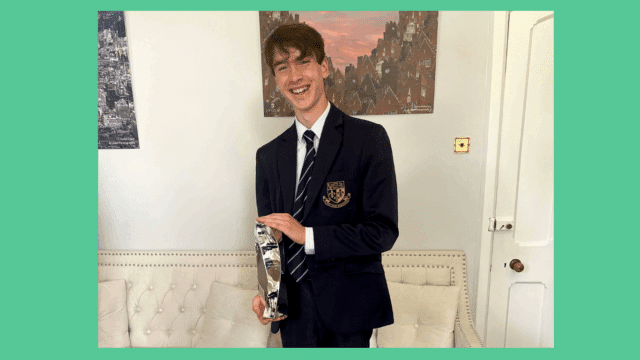“It’s a privilege for me,” Sir Anthony Seldon tells us, when I thank him for having us. I do a double take. “Neither of us has our own Wikipedia page,” I reply, confused as to how it could be a privilege for somebody with a PhD, a knighthood, and over 45 books published to be asked some questions by two Lower Sixth students during his spare time. “Is it good to have a Wikipedia page?” he asks. There’s an inimitable earnestness to his words, and indeed all the interview.
“Why did the field of history and education appeal to you?” was our first question. He says he loved history growing up, and has never been sure why, “it’s quite hard to say why we like some subjects more than others.” He does regret not having read history or English at university over PPE, though. Education as a career wasn’t exactly clear-cut to him either. I’ve practically never heard a teacher say they dreamed of that career from a young age, and even Sir Anthony was no exception. He cites his main inspiration for the career as his wife, calling her much smarter than him and commenting that he just thought he’d try it. He started teaching at Whitgift School in Croydon, loved it, and the rest is, well, history.
“It’s a school which has been doing an excellent job for many years”
Our second question focused on the present. “What sets Epsom apart from your previous schools?” “It’s a school which has been doing an excellent job for many years,” praising previous heads Mr Piggot and Mrs Pattison, commenting that the latter “would’ve been spectacular” in a solemn and pensive tone. He’s of the view the School is running smoothly as it is, and other than settling it after what happened, and helping it to get ready for his successor he doesn’t think it needs much input from him to flourish. He warmly remarks that he doesn’t look at Epsom critically, in terms of what he could change, but instead he looks at it “lovingly” and thinks about how much of its potential he could help it to achieve.
Then a more academic question. “If you could make one major reform to the government, what would it be?” He answers it off-the-bat; he’d simply “ensure that government ministers know something about history.” He criticises Prime Ministers especially, as often “coming into the most powerful job in the country knowing less about what the job is than most politics A-level students.” As a politics student myself, this impacted me even more – somebody who’s been working up and close with Prime Ministers for decades telling me I’d probably be able to do it better than them seems a bit of a dire assessment.
“blow the whole thing up”
“What single historical event has had the most profound impact on shaping the world as we know it today?” “The Big Bang was pretty influential,” he jokes. After that, though, the discovery of the wheel, the ability to grow crops, and the printing press. On the total opposite end of the spectrum he cites the discovery of AI as well – the invention of the printing press and of artificial intelligence might seem diametrically opposed, but perhaps they’re quite similar: both are just improvements on how we share and learn information. Additionally, he mentions the “Axial Age” from 500 BCE onwards, which catapulted the spread of religion across the world, of which Christianity was prominent.
“Where do you see society by the year 2050?” I apologise for it being a vague question. He tells us straightforwardly he can’t give a clear answer to that because we just don’t know. “Human unpredictability” is what he blames for this – rocky presidential candidates, the development of AI, and global warming are just a few of these factors. He does say with some quick mental maths that it’s possible society won’t change that much – 2050 is 26 years in the future, and society in 1998, 26 years ago, didn’t look all that different to how it does today. He brings up a sharp quote from his friend, the Astronomer Royal Lord Martin Rees: “in the era of the global village, you just need one village idiot to blow the whole thing up.” In general, though, he says he tends to think the good people will prevail despite all the bad out there.
“ultimately anti-intellectual”
Out of genuine curiosity over what he said about religion, I ask. “How far do you think religion motivates humanity?” Even speaking as a theist, he states that he thinks religion is problematic for many people. “Lots of good in the world is done by people who aren’t religious and lots of bad is done by those who are.” Despite his criticism of some religions, though, to believe is inherently a humble and intellectual act. In his words, “to deny the existence of a supernatural force in the world is ultimately anti-intellectual because you are left with one question: “why is there something rather than nothing?”” All an atheist can reply to this is “we don’t know”. There is an explanation for everything in the universe in Sir Anthony’s view, hence why he prefers agnosticism to pure atheism
Our final question is one that has a 50% chance of coming up in every single interview ever conducted. “If you could have dinner with any person, dead or alive, who would it be and why?”. President Kennedy is his first choice for his ideal dinner party, to understand more about his inspiration. In contrast, he’d add Lenin to understand more about whether it was hatred or love that inspired his ideals, Mao to find out if he really was as “big a monster as Stalin”. The last two are perhaps probably the most inventive answers I’ve ever heard to that question; Kate Bush because she’s an “extraordinary woman” and Adele because “if everybody was getting very boring at least she could sing.” The interest, rigour and diversity of Sir Anthony’s dinner table is a fitting summary of this interesting, rigorous, and diverse man.





